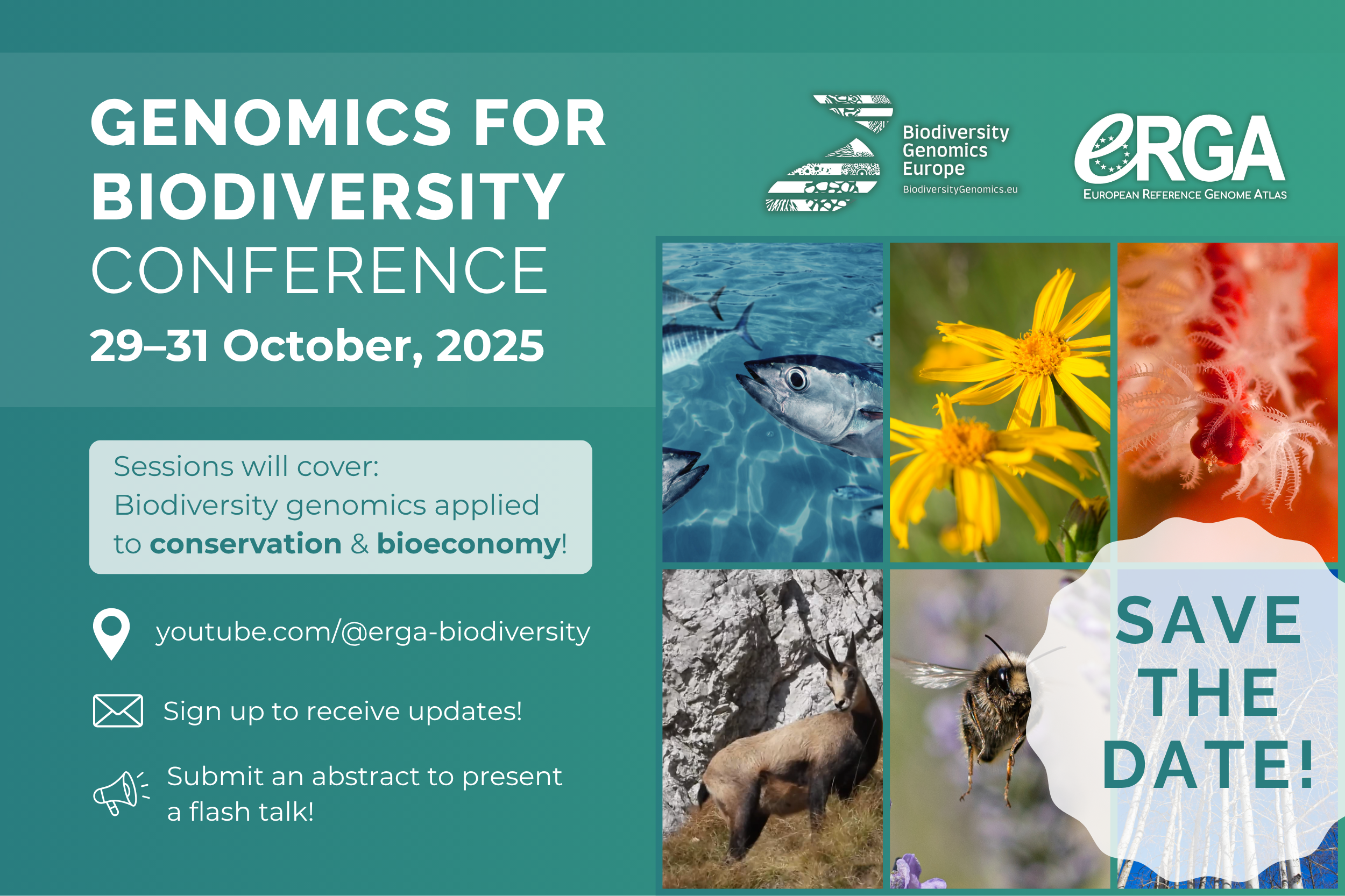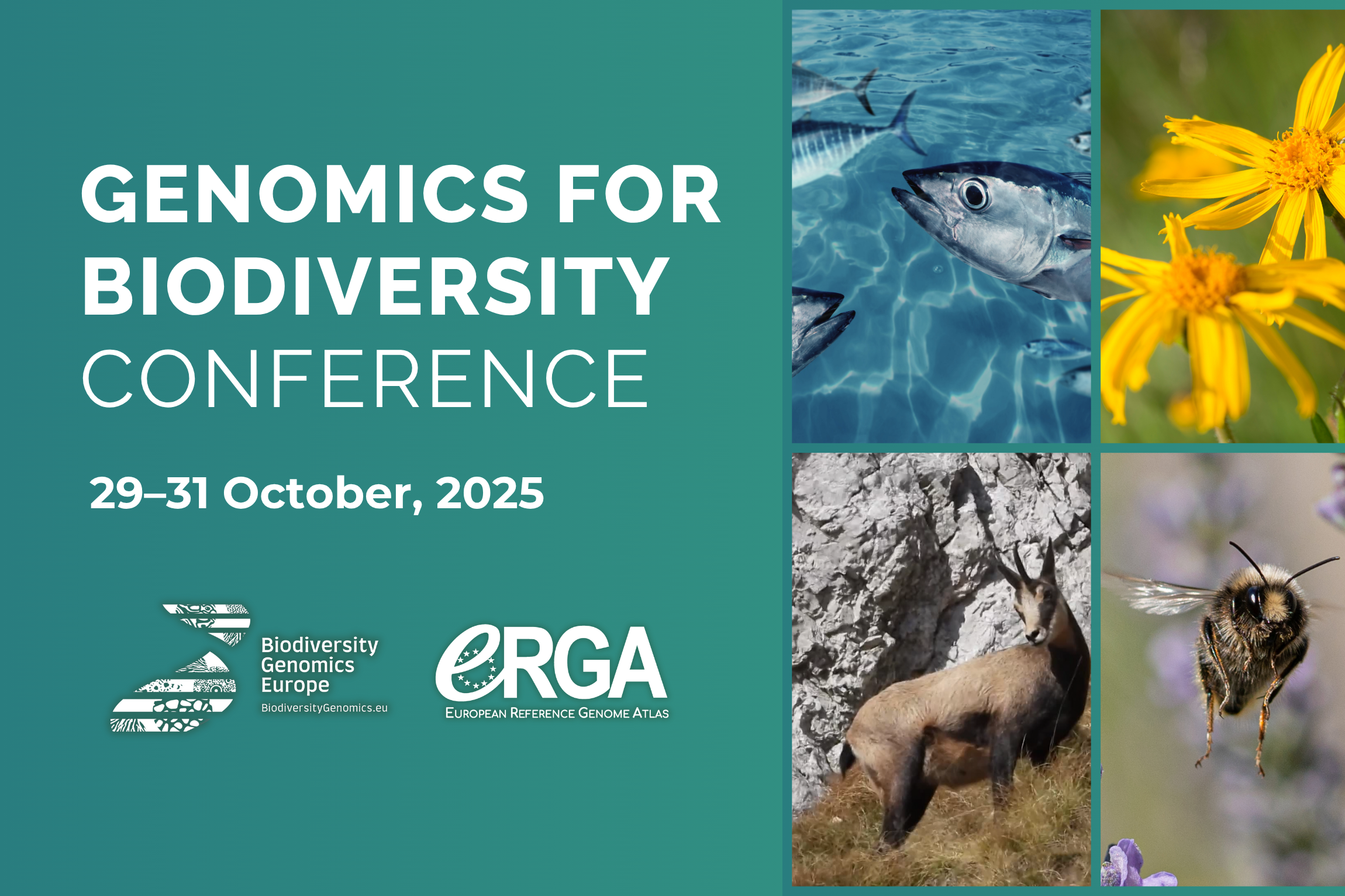7 August 2025
Genomics for Biodiversity Conference – from genomes to impact
29–31 October 2025
Summary
🗓️ Dates: 29 – 31 October 2025 (click to add to your agenda!)
🔗 Online venue: ERGA YouTube Channel
📢 Open call for abstracts: Deadline September 15th (more information below)
We are excited to announce the Genomics for Biodiversity Conference organised by ERGA-BGE, which will be held on October 29 – 31 and transmitted live through the ERGA YouTube channel. Participation is free of charge.

The event aims to bring together researchers and other stakeholders interested in applied biodiversity genomics and will showcase how it can have an impact on real-world issues, focusing primarily on biodiversity conservation and the bioeconomy.
Through two and a half days, the conference will include:
-
Keynote talks – addressing the links between biodiversity genomics, policy, and society.
-
Invited speakers to be announced soon!
-
-
29 Genomic for biodiversity projects presentations – they will showcase the applied use of biodiversity genomics across Europe and a diverse set of eukaryotic species.
-
Click here to learn more about the projects.
-
-
Round tables and hands-on workshop – activities focused on boosting stakeholder engagement in genomics.
-
3 sessions focusing on Genomics applied to biodiversity conservation, bioeconomy, and standardisation.
Click here for a detailed programme
ERGA-BGE Case Studies
The Biodiversity Genomics Europe Project and ERGA have supported 29 research projects that demonstrate the applications of genomic data to improve our understanding of biodiversity. In this conference, research project participants will have a chance to come together, share scientific results, and exchange experiences. Learn more about the projects in the interactive map on ERGA’s website.
Call for abstracts – Parallel sessions
On Friday, 31 October 2025 (11:30–13:00 CET), three parallel breakout sessions, Conservation Genomics, Bioeconomy Genomics, and Genomic Data Standardisation, will run concurrently on separate YouTube streams.
Each session will open with four consecutive 5‑minute flash talks (20 min total) that distill methods, key findings, and practical relevance, immediately followed by a 40‑minute moderated round table where the speakers, additional researchers, and stakeholders address real‑time questions from the audience. At 12:30 CET, all participants reconvene in the main room, and the moderator from each breakout will deliver a 10‑minute synthesis of key insights, consensus points, and action items (total 30 min). The distilled outcomes, together with the abstracts and discussion notes, will feed directly into the ERGA‑BGE flagship manuscript being drafted by the 29 funded case studies, giving presenters and active participants a clear pathway to co‑authorship.
Abstracts should therefore describe a genomics‑driven study that fits one of the three themes and can be communicated clearly within a timed and visually engaging five‑minute presentation:

-
Conservation genomics – From data to decision making
Population‑level genomic analyses will be discussed for their capacity to delineate management units, quantify adaptive potential, and predict responses to environmental change. Flash-talk and case studies will showcase how such evidence has been, or could be, communicated to conservation authorities. The round table session will aim to outline best‑practice pipelines and identify outstanding research gaps for inclusion in the conservation section of the ERGA‑BGE flagship manuscript.
-
Bioeconomy genomics – Turning biodiversity into sustainable value
High‑throughput sequencing applications that enable enzyme mining, biomaterial discovery, and genomics‑informed crop and lineage development under circular‑economy principles will be presented and examined. Speakers will highlight pipeline innovations that shorten the path from sequence to applications. The discussion will consider scalability and biodiversity safeguards from academic and industrial perspectives. Session insights will help delineate the priority taxa, data infrastructures, and translational frameworks for the ERGA-BGE flagship manuscript’s bioeconomy section.
-
Genomic data standardisation – Building the common language
Recent standardisation proposals (e.g., Buzan et al., 2025) will serve as a starting point to analyse current deficiencies in sampling, metadata capture, and analytical reproducibility that hinder comparative genomics. Talks will be focused on standard‑compliant and ad‑hoc pipelines across evolutionary and applied studies, followed by a round‑table discussion on drafting minimal‑information checklists and interoperability roadmaps. The resulting guidelines are intended to inform the ERGA-BGE flagship manuscript’s methods synthesis and facilitate robust meta‑analyses across conservation and bioeconomy applications.
The abstract submission deadline is September 15th. Selected speakers will be notified by October 7th.




